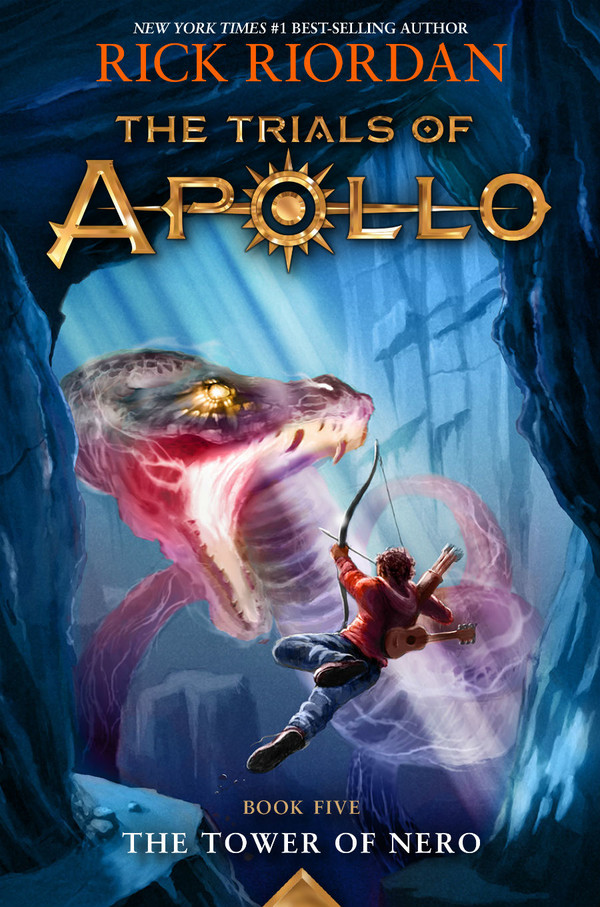In 2005, Rick Riordan published a novel about a twelve-year-old boy with dyslexia and ADHD who discovers that he is the son of the ancient Greek god Poseidon. What began as a bedtime story inspired by his own son, who himself had dyslexia and ADHD, ended up becoming a whole saga of stories that brought mythology into the lives of an entire generation. Fifteen years and fifteen books later, The Tower of Nero serves as the closing chapter to Riordan’s Camp Half-Blood Chronicles.

Not only did Tower of Nero conclude a saga of fifteen books, it is also the fifth and final book of the Trials of Apollo, Riordan’s third series inspired by Greek and Roman mythology. The first of these series, Percy Jackson and the Olympians, is a coming-of-age story set against the backdrop of Greek gods and mythological monsters, while the second, Heroes of Olympus, sees seven different teenage demigods come together as they struggle with their own identities. Trials of Apollo sets itself apart by having an ancient deity, rather than an adolescent demigod, as its protagonist. Apollo, the sun god, finds himself turned into a mortal, and in his fight to regain his godhood, he learns a little bit about what it means to be a human.
Tower of Nero is a typical Riordan novel. It contains his signature wit and humor, sprinkled with pop culture references alongside Apollo’s cheeky irreverence. It also has plenty of fast-paced action that readers have come to expect from Riordan — some scenes may be predictable but are just as fun to read. The plot itself is quite straightforward, more so than the series’ previous installments. All in all, Tower of Nero has the familiar charms, as well as downfalls, of most of Riordan’s novels.
As the conclusion to the Trials of Apollo series, there were mainly two things that the book needed to wrap up: the epic final battle with the Roman emperor Nero, and Apollo’s growth as a character. For the former, the book doesn’t quite meet the expectations built up by the previous books. Although the big showdown feels high-stakes, it doesn’t quite match the large scale of previous series enders like The Last Olympian or The Blood of Olympus. Plus, the villain Nero ended up being more of a cartoonish character rather than the sinister presence he was set up to be. Nevertheless, the book managed to address any loose ends from the last four books.
On the other hand, Tower of Nero ties up Apollo’s character arc in a very satisfying manner. His growth from being a self-absorbed god to becoming more human in the best ways felt natural and earned, founded on his journey full of friendship and suffering. By the end, the reader might even feel proud of the character. Equally significant is the development of Meg, Apollo’s demigod companion, from a traumatized little girl to an independent person healing from her pain. Through Apollo and Meg, Riordan demonstrates his ability to completely transform characters without it being forced or jarring.
Aside from the two main characters, Tower of Nero also bears the responsibility of giving long-time fans one last look at the characters they’ve come to know and love from Percy Jackson and Heroes of Olympus. Like the other books in Trials of Apollo, it features characters from the previous series — in this case, Nico di Angelo, son of Hades, and his boyfriend Will Solace, son of Apollo, feature heavily. The Trials of Apollo books utilize such characters in a way that may seem like fan service, but they serve their purpose in the story and give long-time readers a taste of the familiar without overshadowing the new leads. In this book, Riordan also reassures fans that most of their favorite characters, not just Nico and Will, are living their lives and having their own adventures. There’s an implicit promise that their journeys haven’t come to an end — even if we won’t get to tag along anymore.
Six years ago, many readers weren’t satisfied with how Blood of Olympus concluded the stories of their favorite demigods. With Trials of Apollo, Riordan had the opportunity to not just tell new stories set in his familiar world, or continue the stories of his familiar characters — he had a second chance to give a more gratifying conclusion to his readers’ years-long journey. In that, at least, he succeeded. But I wouldn’t be surprised if readers asked for more…

